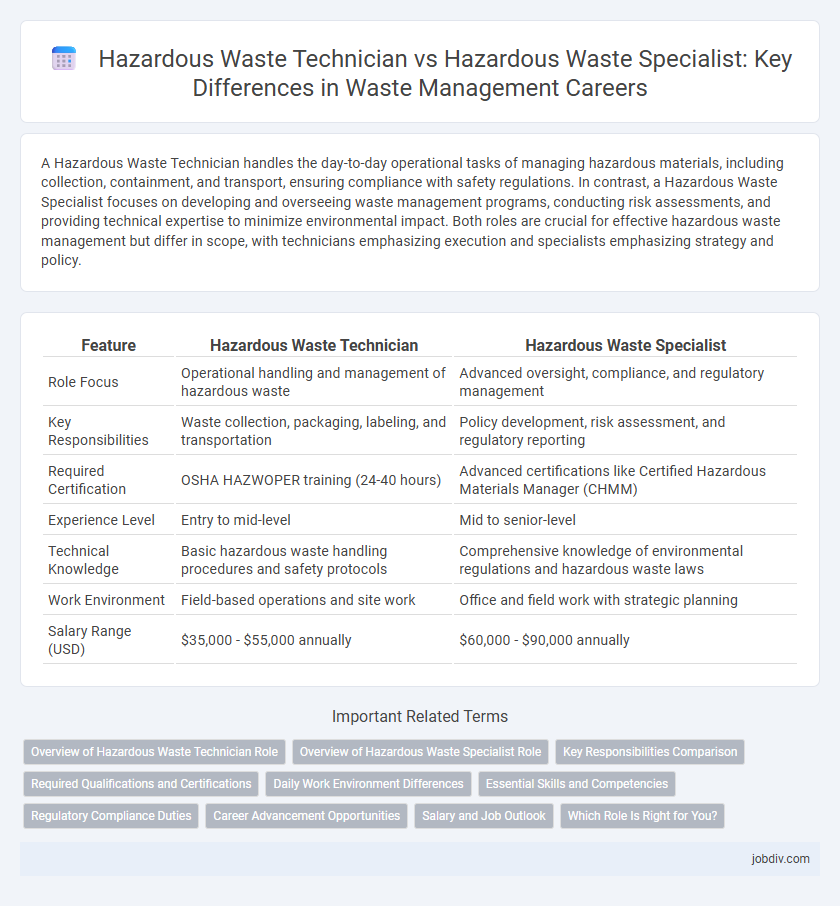A Hazardous Waste Technician handles the day-to-day operational tasks of managing hazardous materials, including collection, containment, and transport, ensuring compliance with safety regulations. In contrast, a Hazardous Waste Specialist focuses on developing and overseeing waste management programs, conducting risk assessments, and providing technical expertise to minimize environmental impact. Both roles are crucial for effective hazardous waste management but differ in scope, with technicians emphasizing execution and specialists emphasizing strategy and policy.
Table of Comparison
| Feature | Hazardous Waste Technician | Hazardous Waste Specialist |
|---|---|---|
| Role Focus | Operational handling and management of hazardous waste | Advanced oversight, compliance, and regulatory management |
| Key Responsibilities | Waste collection, packaging, labeling, and transportation | Policy development, risk assessment, and regulatory reporting |
| Required Certification | OSHA HAZWOPER training (24-40 hours) | Advanced certifications like Certified Hazardous Materials Manager (CHMM) |
| Experience Level | Entry to mid-level | Mid to senior-level |
| Technical Knowledge | Basic hazardous waste handling procedures and safety protocols | Comprehensive knowledge of environmental regulations and hazardous waste laws |
| Work Environment | Field-based operations and site work | Office and field work with strategic planning |
| Salary Range (USD) | $35,000 - $55,000 annually | $60,000 - $90,000 annually |
Overview of Hazardous Waste Technician Role
Hazardous Waste Technicians play a critical role in the safe handling, transportation, and disposal of hazardous materials, ensuring compliance with environmental regulations such as RCRA (Resource Conservation and Recovery Act). They conduct field inspections, monitor waste storage, and document waste management activities to prevent contamination and ensure workplace safety. Their expertise includes identifying hazardous waste types, proper containment methods, and emergency response procedures.
Overview of Hazardous Waste Specialist Role
The Hazardous Waste Specialist is responsible for managing and ensuring compliance with regulations related to hazardous waste handling, storage, and disposal. This role involves developing waste management plans, conducting site assessments, and providing technical guidance to minimize environmental impact. Unlike hazardous waste technicians who primarily perform hands-on tasks, specialists focus on regulatory compliance, policy implementation, and risk assessment to support sustainable waste management practices.
Key Responsibilities Comparison
Hazardous Waste Technicians primarily handle the collection, labeling, and proper disposal of hazardous materials following regulatory standards, ensuring safety during waste transportation and storage. Hazardous Waste Specialists focus on developing and implementing waste management plans, conducting risk assessments, and ensuring compliance with environmental regulations and reporting requirements. Both roles require knowledge of OSHA, EPA guidelines, and hazardous material protocols, but Specialists typically engage in strategic planning and regulatory documentation, while Technicians execute operational tasks.
Required Qualifications and Certifications
Hazardous Waste Technicians typically require certifications such as 40-hour HAZWOPER training and a strong understanding of waste handling protocols to ensure safe operations. In contrast, Hazardous Waste Specialists often need advanced qualifications including State or EPA Hazardous Waste Management certifications, along with expertise in regulatory compliance and environmental risk assessments. Both roles demand knowledge of OSHA standards, but Specialists usually engage in policy implementation and complex waste management strategies beyond the Technician's operational focus.
Daily Work Environment Differences
Hazardous Waste Technicians primarily operate in on-site, hands-on environments such as waste treatment plants or cleanup sites, handling physical waste management tasks and equipment operation. Hazardous Waste Specialists often work in office or regulatory settings, focusing on compliance documentation, risk assessments, and coordinating waste management programs. The technician's role involves direct exposure to hazardous materials, while the specialist emphasizes oversight, policy implementation, and environmental safety protocols.
Essential Skills and Competencies
Hazardous Waste Technicians possess essential skills in handling, packaging, and transporting hazardous materials safely following regulatory guidelines such as OSHA and EPA standards. Hazardous Waste Specialists demonstrate advanced competencies in risk assessment, regulatory compliance, and developing waste management plans for hazardous substances. Both roles require strong analytical skills, attention to detail, and proficiency in safety protocols to mitigate environmental and health risks effectively.
Regulatory Compliance Duties
Hazardous Waste Technicians primarily focus on the hands-on regulatory compliance tasks such as proper waste handling, labeling, and ensuring facility adherence to EPA and OSHA hazardous waste standards. Hazardous Waste Specialists oversee comprehensive regulatory compliance programs, including the development of waste management policies, conducting audits, and ensuring alignment with federal and state environmental regulations like RCRA and CERCLA. Both roles are critical in maintaining safe and compliant hazardous waste operations, with Specialists often taking a strategic compliance leadership position.
Career Advancement Opportunities
Hazardous Waste Specialists typically have advanced certifications and experience, positioning them for supervisory or managerial roles overseeing waste management programs. Hazardous Waste Technicians often focus on hands-on operational tasks but can advance by gaining specialized training and certifications to qualify for specialist roles. Career progression from technician to specialist involves mastering regulatory compliance, hazardous materials handling, and environmental safety standards.
Salary and Job Outlook
Hazardous Waste Technicians earn an average salary of $43,000 to $57,000 annually, with job growth projected at 6% over the next decade due to increasing environmental regulations. Hazardous Waste Specialists typically command higher salaries ranging from $60,000 to $85,000, reflecting their advanced expertise and leadership roles in managing complex waste disposal and compliance. Both positions benefit from growing demand in sectors like manufacturing and environmental services, but Specialists experience stronger job prospects and higher earning potential.
Which Role Is Right for You?
Choosing between a Hazardous Waste Technician and a Hazardous Waste Specialist depends on your career goals and expertise level. Technicians typically handle hands-on tasks such as waste collection, labeling, and compliance monitoring, requiring technical skills and on-site experience. Specialists focus on waste management strategies, regulatory compliance, and risk assessment, making this role suitable for individuals seeking leadership and policy development opportunities in hazardous waste management.
Hazardous Waste Technician vs Hazardous Waste Specialist Infographic

 jobdiv.com
jobdiv.com